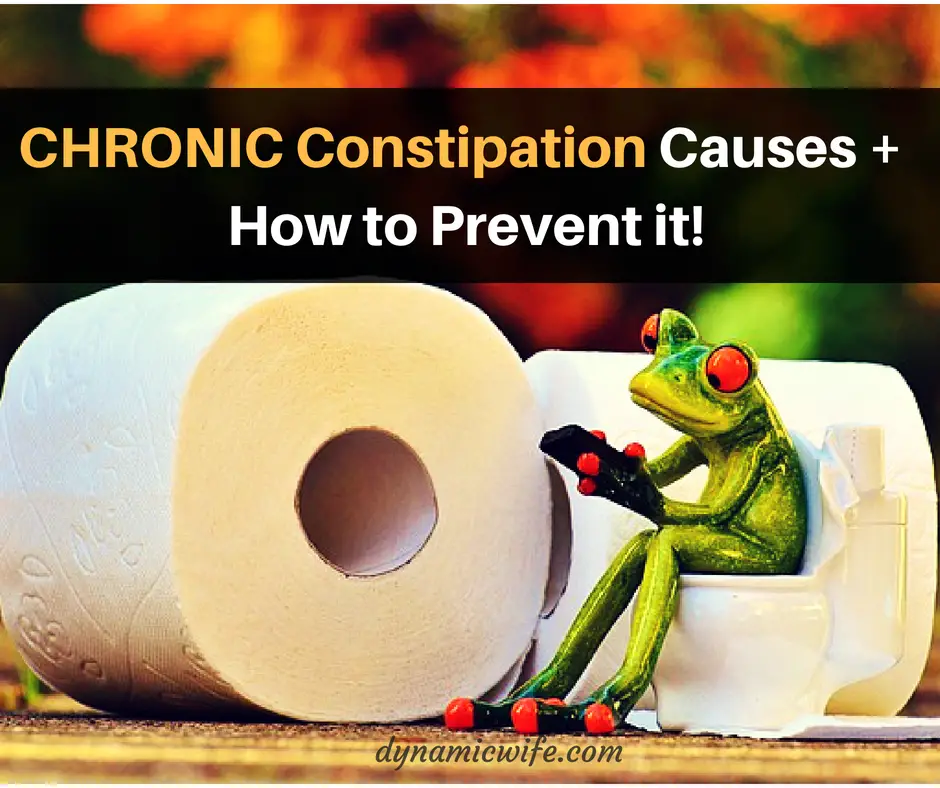Research reveals chronic constipation affects over 15% of the US population.

SEE ALSO: Best remedy for legs cramp
Constipation is the difficulty in passing stools, or the infrequent passages of bowel movements. Stools may be hard, dry, and can move very slowly through the large intestine. It is not uncommon to experience constipation from time to time, but chronic constipation can be very bad for your health and can lead to other health problems.
Most people often take it lightly and almost ignore the hard to ignore symptoms of constipation until it becomes chronic and more serious.
While constipation is a serious health problem, it is not always necessary to have to go on a prescription or over the counter drug to take care of the problem. There are many natural home remedies for constipation that actually work.
What is chronic constipation?
Constipation is a common problem that we all face from time to time.
For instance, if you don’t drink enough water for a few days, you may start noticing that you aren’t able to pass bowel movement as easy as you should or as frequently as you normally do.
Now, this really becomes a problem when it happens on a regular basis.
Chronic constipation is defined as when you have 2 or more symptoms of constipation present for over 12 weeks out of the previous 12 months [1].
It affects all ages and both sexes, but more commonly reported in women, elderly patients, chronic care residents, and concurrent psychiatric patients [3].
It is also said that those who suffer from chronic constipation rarely complain about loose stool without the use of a laxative and don’t usually meet the diagnostic criteria for Irritable Bowel Syndrome (IBS).
Symptoms of chronic constipation
- Straining
- Hard or lumpy stools
- An abnormal frequency of bowel movement
- Feeling like you haven’t fully emptied after each trip.
- Spending way too long than to empty your bowels.
- Feeling like there’s a blockage in your rectum/anus.
- Pain or irritability during bowel movements.
- Less than 3 bowel movements per week.
These are the common symptoms of constipation and if 2 more of these symptoms are present for over 3-6 months, you’re more likely suffering from chronic constipation [2].
What causes chronic constipation?
The 3 main culprits of constipation are a low intake of fiber and fluid, and lack of physical activity [4].
Other causes include lack of exercise, age, muscle or structural disorders or abnormalities, bowel or digestive disease, poor diet, medications, iron supplements and even pregnancy.
Lack of fiber
Dietary fibers are resistant to hydrolysis by small intestine enzymes which means they pass unabsorbed to the colon. In the colon, fiber retains water and adds bulk to the stools.
Increasing fiber intake can also help reduce the symptoms of constipation.
Low intake of fluids

The second main cause of constipation is not drinking enough water.
Drinking at least 2 liters of water per day will make it easier for the fiber to retain it and provide relief from constipation.
Without adequate intake of fluids, the stool in your colon dries up and makes it difficult to pass through the rectum, resulting in what we call constipation symptoms.
Lack of physical movement
Lack of physical activity is also strongly associated with constipation.
People who work in office environments and any job that requires one to sit all day have more chances of suffering from constipation than those who with jobs that have more physical movement.
Healthy people who’re fairly active help their colon to work better by improving colorectal mobility.
In plain English, being physically active and doing some exercise on a regular basis will help the stool to move faster from your colon to its way out [5].
You don’t have to join the gym or start jogging every morning (although it’s beneficial), simply getting off your bed and couch and attempting to do some house chores like cleaning your garden would also make a big difference.
It is important to have regular bowel movements for many reasons. Perhaps the most important reason is the most obvious, the removal of toxins from the body. Colon is where waste matter is stored including bad bacteria, toxins, and antigens.
Risks of Laxatives and Medications
The overuse and abuse of laxatives, even herbal laxatives, can cause the bowel to become lazy, and depend on laxatives for regular bowel movements. What will happen is the muscles will lose their ability to constrict without the assistance of laxatives.
If you have become dependent on laxatives, it is important to try and start to wean yourself off of them and retrain your body to have natural bowel movements.
To return to regular movements, you can follow some of the advice here on this page.
You should also try sitting on the toilet for 20 minutes every morning and focus on relaxing the muscles of your colon so that your body can remember how to have bowel movements without the assistance of laxatives or drugs.
10 Home Remedies for Chronic Constipation

Below are some safe and healthy ways to help beat constipation and regain your health. It is also common to experience other health benefits such as weight loss, reduced cholesterol, and lowered blood pressure when these changes are implemented.
1.Increase Your Fiber Intake
Fiber comes in many forms, and fortunately, all most all of them are healthy and good for you. Consider upping your daily intake of fruits and vegetables. Try to eat more whole grains in the diet.
Beans are also loaded with healthful fibers and they are good for cholesterol levels. Some of the best fiber supplements to add to your diet are psyllium seed husks and oat bran.
Psyllium Husk powder is one of the strongest natural dietary fiber for promoting regularity and supporting heart health. It is most effective when used every day, and can be used as long as desired.
How about eating some leafy salad with avocado for lunch or dinner? Fruit and veg smoothies can also help increase your daily fiber intake because smoothies include most of the fiber content of the fruits/veg.
2. Drink More Water!

Drink a minimum of 6-8 glasses of water a day. Fruit juices and herbal teas are good too. Avoid coffee, alcoholic beverages, and soft drinks as they have a dehydrating effect on the body.
In general, try to increase your consumption of water. Most of the time we drink too little.
They say that when you feel hungry between meals it’s not your need for food that manifests in the hunger but the need for water.
Drinking warm water with lemon juice first thing in the morning also seems to help relieve constipation for many people.
There are many apps you can download on your phone to start tracking your daily water intake. It might help to motivate your progress and experts say that anything practiced for over 21 days can easily become a habit.
Fill up some bottles of water and keep it by your bed or where ever you spend most of the time so it’s hard to avoid drinking it.
Do not, however, make the mistake of trying to drink too much water all at one go. Just take some sips here and there and you’ll get used to it.
3. When Nature Calls, Listen
Ignoring your body’s natural urges for a bowel movement can lead to constipation. Take time each morning for a bowel movement and be sure to go at any time of the day that you may feel the need.
Remember, it is important to listen to your body and not fight against its needs, especially when your health is at stake.
4.Increase Your Bowel and Intestinal Flora
Candida and bad bacteria can cause the digestive system to slow down. A proper balance of bowel flora is crucial to the support of the immune system response.
Get into the habit of eating plain organic yogurt on a regular basis and you can also start taking good bacteria supplements from reputable brands.
Avoid flavored yogurts with added sugar and artificial sweeteners.
5. Magnesium for Constipation
Magnesium is needed to help keep peristalsis, the rhythmic muscle contraction, and relaxation, working by helping muscles to properly relax.
Most people are magnesium deficient and when there is a deficiency or an imbalance of calcium and magnesium, constipation can occur.
Magnesium is a very needed mineral that people tend to have less with age and is considered by some an indispensable supplement. Magnesium is safe to take via food and supplement form and should be taken daily to protect your heart, to manage the calcium in your body avoiding calcium deposits in joints and kidneys and many other advantages.
Magnesium is an ultimate weapon against chronic constipation, the one thing that will work for people that do not find durable relief with anything else.
6. Medications Can Cause Constipation
One of the leading causes of constipation is medications. Some of the most common culprits are antacids that contain aluminum, pain relievers, antispasmodic drugs, antidepressants, iron supplements, tranquilizers, and even laxatives.
If you have noticed your constipation starting around the same time that you started taking your meds, discuss this with your doctor and alternative medicine may alleviate the problem.
7. Vitamin C

Most experts agree that determining Bowel Tolerance is the best method to establish what amounts of Vitamin C your body requires for maximum protection. When your body is under stress, your need for Vitamin C is increased considerably.
Vitamin C is not toxic and therefore, your body will tell you when you have taken enough. If you experience diarrhea or soft stools, it is a sign that your body has reached Bowel Tolerance (BT). Once you reach BT (whether it is 1 gram or 20 grams) you can cut back to 75% of the dose that represents BT for you and then keep taking that dose EVERY DAY.
Keep track of the 4 daily doses (begin with 500 mg recommended) because you will be increasing your intake gradually until you find the amount that you need for maximum immune support.
Vitamin C appears to be most effective in fighting disease when the dose is close to the bowel tolerance limit. This dosage information is important enough that it could literally save your life. Incidentally, excreted Vitamin C is not a complete loss.
According to Nobel Laureate Dr. Linus Pauling, Vitamin C protects against urinary tract infections. The laxative effect of Vitamin C is said to be greater when the vitamin is taken on an empty stomach.
8. Eat your oatmeal
Many people are satisfied with the fiber they get from oatmeal, particularly the old-fashioned one that takes longer to cook. Breakfast is the best moment for oatmeal consumption but if you prefer some other type of breakfast then you can make a delicious soup with your oats.
Just cook a good stock and keep it in the freezer in several containers; use one of these to prepare an excellent soup with the oatmeal and some chopped vegetables.
9. Eat whole rice
Not all whole cereals are created equal. Go and try to fix your constipation with whole wheat bread, and no matter how many fancy cereals are added to the formula you can be pretty sure that it won’t do a thing to alleviate constipation.
Now, white rice might be one of the surest things to aggravate your chronic constipation. This is not always true for every individual, but there is a general consensus about white rice.
As opposed to this, you have whole rice. Whole rice is beneficial for your intestines, do not ask me why it’s just a fact of nature. Many people are able to get away and stay away from constipation just by eating delicious whole rice. You use whole rice as a substitute for the white.
10. Prunes Juice
The old helper, well known around the world to help alleviate constipation: prunes. You can drink the juice at any time of day. It’s good to munch the prune itself, between three to six every day.
Any of the formulas will work: munching on prunes, having prunes compote (cooked prunes), or drinking prune juice. For some people, it’s their daily lifesaver against chronic constipation.
Do you suffer from Chronic constipation?
Share your experience in the comments below.